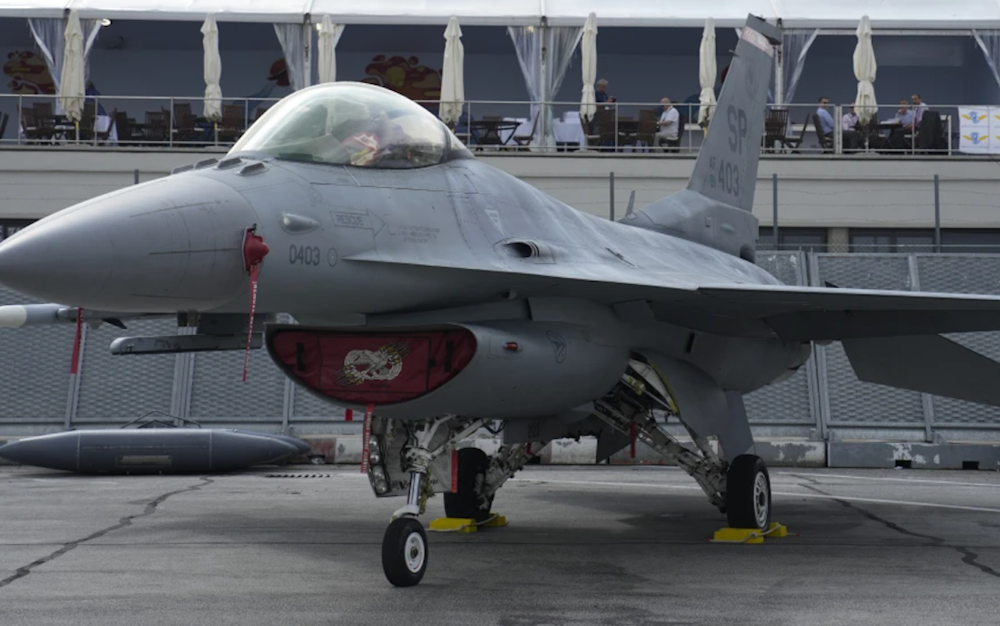Ukraine pilots in F-16 training in US to graduate late summer: Report
In May, an unspecified number of Ukrainian pilots from a batch of 12 finished F-16 fighter jet training at Arizona's Morris Air National Guard Base.
-

US Air Force F-16 fighter jets on display during the Paris Air Show in Le Bourget, north of Paris, France on June 19, 2023. (AP)
According to an Arizona Air National Guard official speaking to Sputnik, the remaining Ukrainian pilots in the US are anticipated to complete their F-16 training by late summer.
"The remaining pilots are expected to graduate by late summer," the representative added.
Ukraine has been lobbying the United States and its European partners to increase F-16 training for Ukrainian pilots. However, the Arizona Air National Guard has blamed limited training availability for its inability to fulfill the request.
In May, an unspecified number of Ukrainian pilots from a batch of 12 finished F-16 fighter jet training at Arizona's Morris Air National Guard Base, an F-16 fighter pilot training facility.
Kiev F-16 hopes stifled by language barriers, runways, parts shortages
However last week, Bloomberg cited familiar sources divulging that as Ukraine is preparing to receive the F-16 fighter jets it has desperately been awaiting to counter Russia's battlefield gains, the drive to send the jets to Washington's NATO summit is being hampered by delays, doubts about spare parts, and a language barrier between Ukrainian pilots and their foreign trainers.
According to one source, Ukraine may be able to operate a squadron of F-16s, ranging from 15 to 24 planes, well short of the 300 fighters that its leaders have requested. Another source told Bloomberg that Ukraine expects six F-16s this summer and up to 20 by the end of 2024.
The problems have been so severe that some have questioned the appropriateness of deploying the planes to Ukraine, and whether doing so now constitutes an expensive show of support for President Volodymyr Zelensky. In the months after pilots began training, including 12 in the United States, the battlefield has altered, with both sides relying on low-cost drones and Russia strengthening its air defenses.
One senior NATO official identified three major challenges on the planners' minds.
First, the planes must be changed according to their mission, such as reconnaissance or warfare.
Second, Ukraine lacks the necessary lengthy, high-quality runways and shelters to shield the F-16s against Russian attacks.
Third, the logistics of sustaining the planes are complicated, ranging from the need for replacement parts to maintenance requirements and locating engineers. Another NATO source stated that Ukraine is attempting to do in a few months what typically takes three to four years.
Third, the logistics of sustaining the planes are complicated, ranging from the need for replacement parts to maintenance requirements and locating engineers. Another NATO source stated that Ukraine is attempting to do in a few months what typically takes three to four years.
Airfields 'nice, juicy targets'
Jim Townsend, a senior scholar at the Center for a New American Security, divulged that people "shouldn't expect miracles" from the jets, adding that the airfields will be "nice, juicy targets" for Russia since it has already been hitting some of them.
A spokesman for Lockheed Martin Corp., the manufacturer of the F-16, stated that it supports the US response to the war without elaborating on how servicing or components for the planes will be handled.
At the NATO Public Forum on Wednesday, Secretary of State Antony Blinken stated that the transfer of F-16 fighter jets from Europe to Ukraine is now underway.
Zelensky urged NATO leaders to lift all limits on allowing Kiev to strike inside Russia with Western weapons.
"If we want to win, if we want to prevail, if we want to save our country and to defend it, we need to lift all the limitations," Zelensky pleaded.
Simona Soare, senior lecturer at Lancaster University, told Bloomberg that the Russian offensive has convinced some allies that they must listen to Ukraine's demands.
In August last year, Politico reported that Western efforts to train Ukrainian pilots to fly advanced F-16 jets are being hampered by the service members’ poor English language skills.
According to sources, of Ukraine's 32 pilots, only eight had enough English proficiency to partake in a future training program.

 4 Min Read
4 Min Read








